
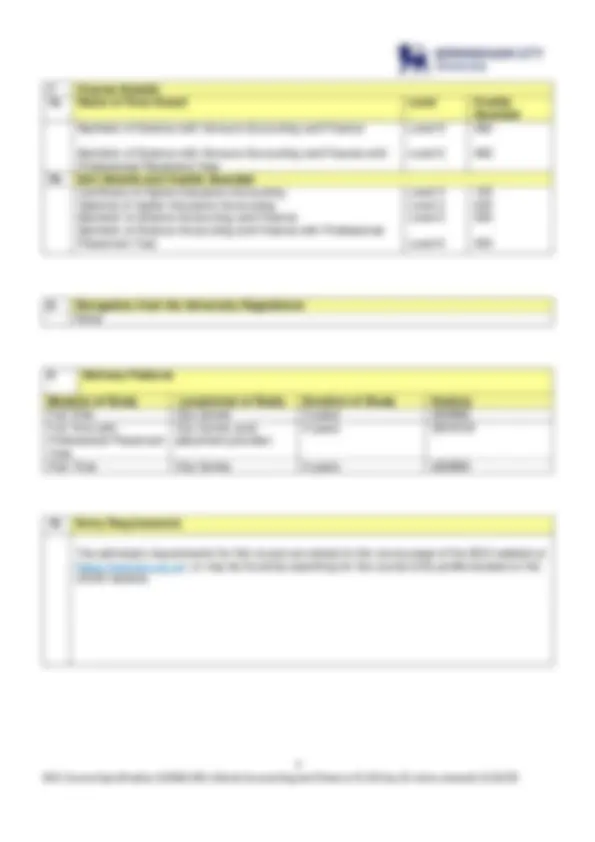
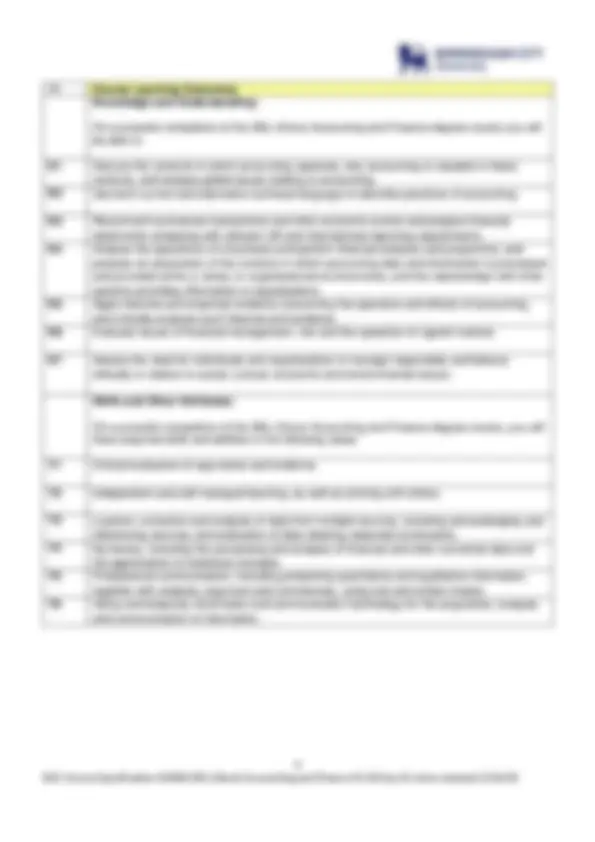
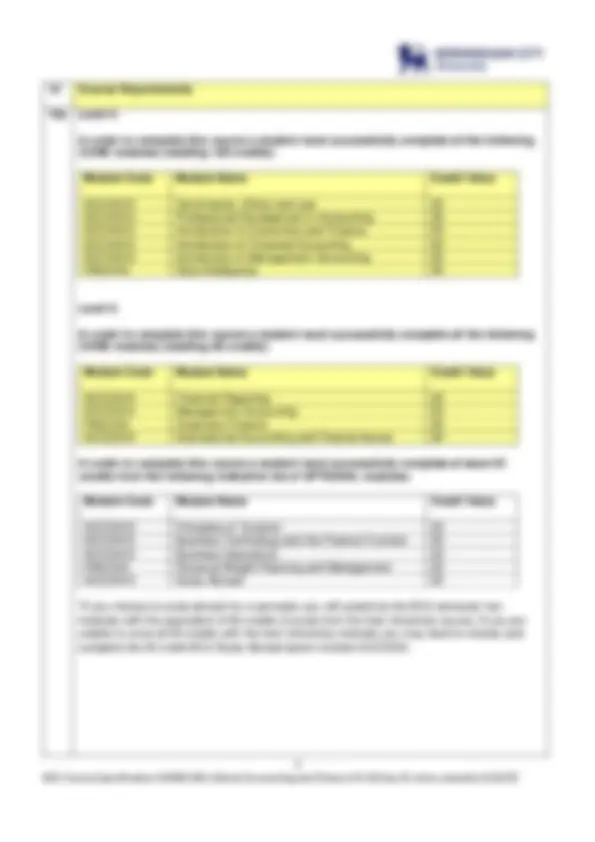
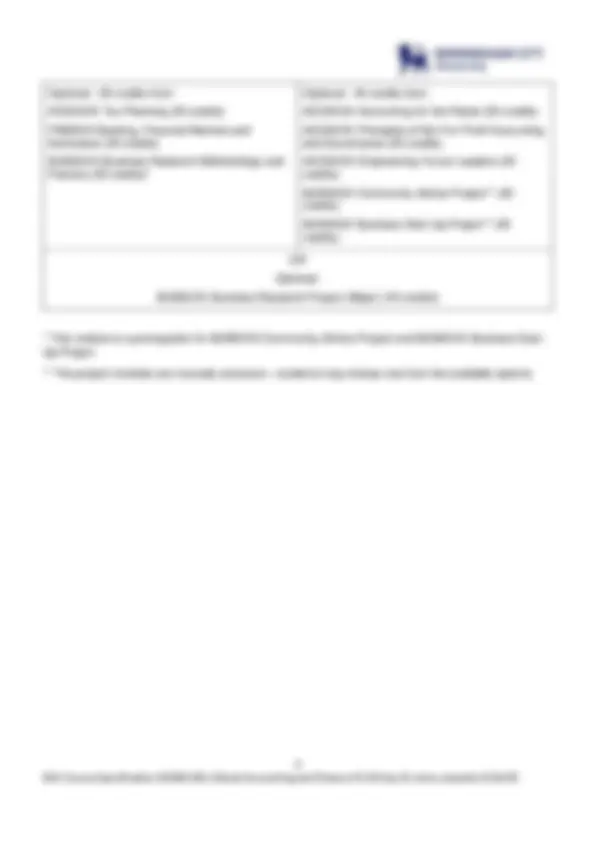
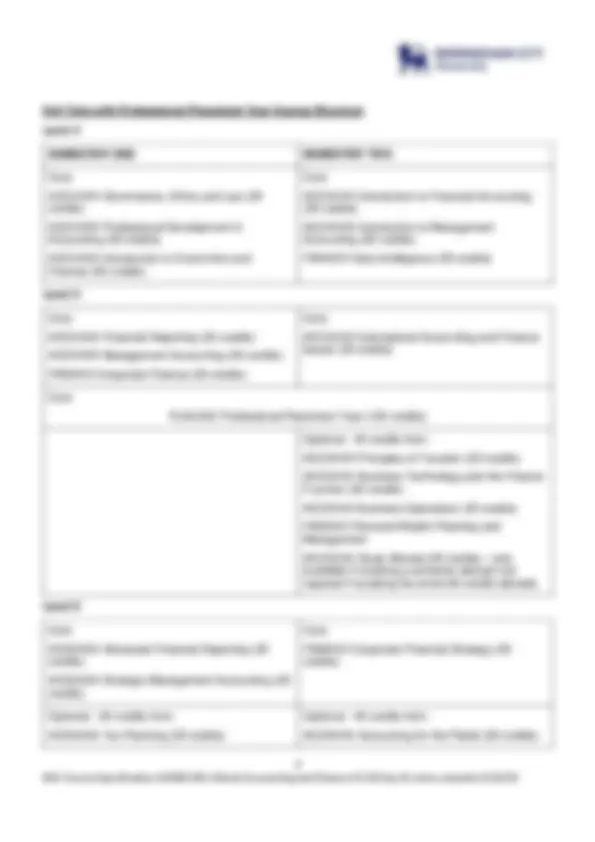
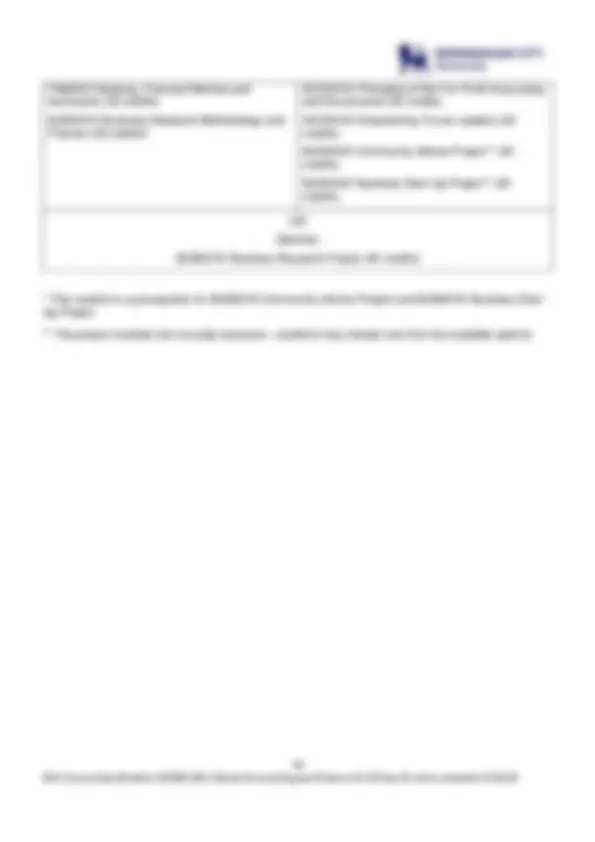
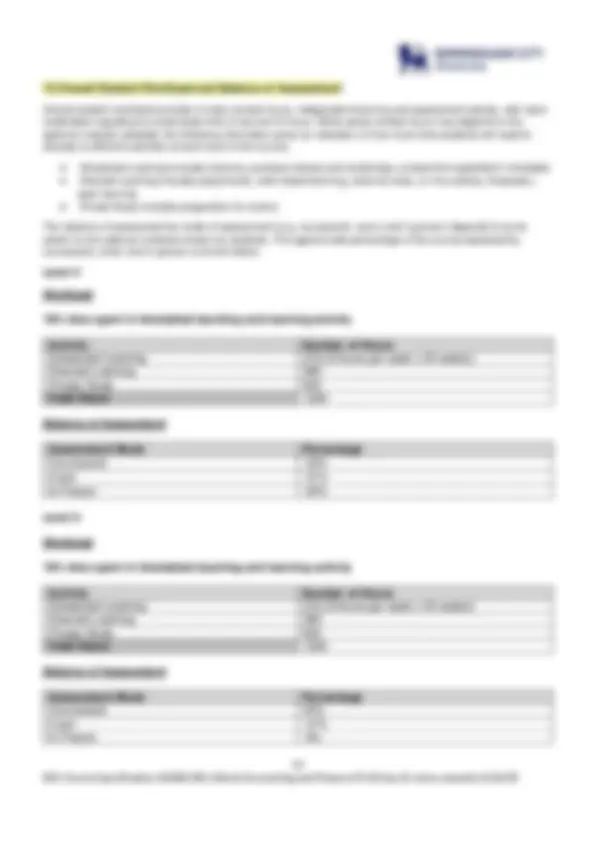
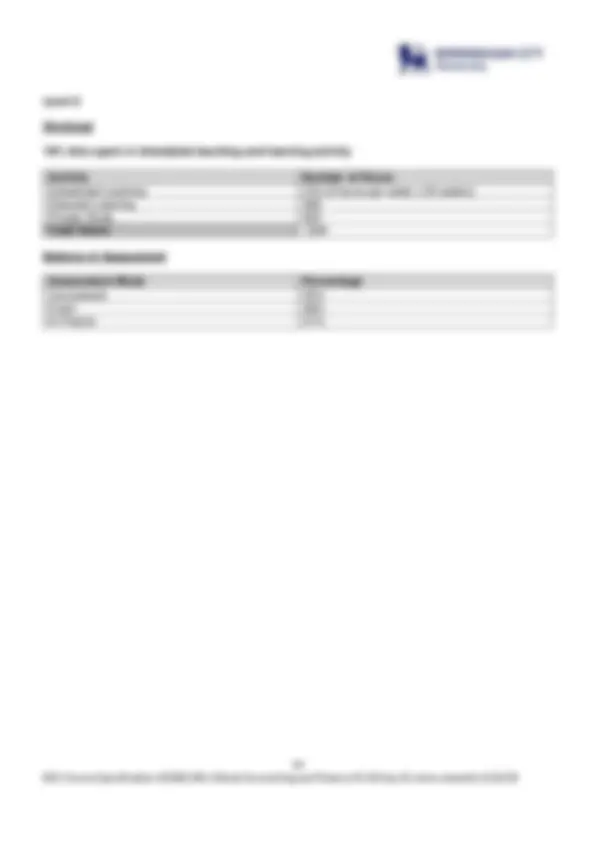


Study with the several resources on Docsity

Earn points by helping other students or get them with a premium plan


Prepare for your exams
Study with the several resources on Docsity

Earn points to download
Earn points by helping other students or get them with a premium plan
Community
Ask the community for help and clear up your study doubts
Discover the best universities in your country according to Docsity users
Free resources
Download our free guides on studying techniques, anxiety management strategies, and thesis advice from Docsity tutors
The BSc (Hons) Accounting and Finance degree at Birmingham City Business School offers insights into accountancy practice, commerce, industry, and finance. It shares a common first year with other accounting courses and is accredited by various professional bodies. The course duration is 3 years for full-time study and 5 years for part-time. Students must complete core and optional modules to qualify for the award. The coursework includes topics like governance, ethics, law, financial reporting, management accounting, corporate finance, tax planning, and business research projects.
What you will learn
Typology: Study notes
1 / 14

This page cannot be seen from the preview
Don't miss anything!









Course Summary Information 1 Course Title BSc (Hons) Accounting and Finance 2 Course Code US 3 Awarding Institution Birmingham City University 4 Teaching Institution(s) (if different from point 3 ) 5 Professional Statutory or Regulatory Body (PSRB) accreditation (if applicable) Association of Chartered Certified Accountants (ACCA) Chartered Institute of Management Accountants (CIMA) Institute of Chartered Accountants in England and Wales (ICAEW) Institute of Financial Accountants (IFA) Association of International Accountants (AIA) Chartered Institute of Public Financial Accountants (CIPFA) Institute of Chartered Accountants of Scotland (ICAS) 6 Course Description The BSc (Honours) Accounting and Finance degree at Birmingham City Business School provides a valuable insight into the worlds of accountancy practice, commerce, industry and finance. We create graduates who possess a global outlook, with the conceptual and applied knowledge in the fields of accounting and finance that will enable them to make a positive impact on society. Delivery of the course is flexible and includes a blend of lectures, workshops, field trips and online learning. The modules, which feed into the course are broad and cover key current topics, such as Sustainable Development Goals (SDGs), and help you to appreciate accounting and finance from a range of perspectives. Ultimately, decision making in this field, calls for one to exercise judgement and intuition and this course helps you to strengthen that judgement. This course has been designed to be accredited by the major professional accounting bodies, including the Association of Chartered Certified Accountants (ACCA), the Institute of Chartered Accountants in England and Wales (ICAEW) and the Chartered Institute of Management Accountants (CIMA), offering significant exemptions from their professional qualifications. What's covered in the course? This course offers an accounting and finance curriculum that is up to date, vocationally relevant, challenging and reflects the complex and challenging nature of the accounting and business environment. You will gain expertise in areas including financial and management accounting, corporate finance, international accounting and finance issues, data analysis and business technology. You will have the opportunity to use software relevant to the modern business environment, equipping you with the skills and experience sought by employers.
You will develop scholarly attributes, becoming an independent learner with the ability to critically evaluate data and evidence, draw reasoned conclusions and communicate effectively in a professional manner. With our practice-based approach to teaching, you will learn from professionally qualified academics with a wealth of industry experience, and research active academics whose research underpins and informs our approach to teaching You will be actively supported and encouraged to undertake an additional professional placement year, providing the opportunity to improve your employability skills. Our students have worked for industry leading accountancy practices including PwC and EY, as well as for organisations such as the NHS, IBM and Vodafone. The international focus of the course is derived through a variety of means including the study of international accounting standards, student body, the teaching team and the use of international teaching materials. Moreover, students can choose to spend a full semester studying their modules overseas at a partner institution. This course shares a common first year with other accounting courses within the Business School with full transferability between courses at the end of the first year.
11 Course Learning Outcomes Knowledge and Understanding: On successful completion of the BSc (Hons) Accounting and Finance degree course you will be able to: K1 Discuss the contexts in which accounting operates, why accounting is valuable in these contexts, and analyse global issues relating to accounting. K2 (^) Use both current and alternative technical language to describe practices of accounting. K3 Record and summarise transactions and other economic events and prepare financial statements complying with relevant UK and international reporting requirements. K4 Analyse the operations of a business and perform financial analysis and projections; and possess an awareness of the contexts in which accounting data and information is processed and provided within a variety or organisational environments, and the relationships with other systems providing information in organisations. K5 Apply theories and empirical evidence concerning the operation and effects of accounting, and critically evaluate such theories and evidence. K6 Evaluate issues of financial management, risk and the operation of capital markets. K7 Assess the need for individuals and organisations to manage responsibly and behave ethically in relation to social, cultural, economic and environmental issues. Skills and Other Attributes: On successful completion of the BSc (Hons) Accounting and Finance degree course, you will have acquired skills and abilities in the following areas: T1 Critical evaluation of arguments and evidence. T2 Independent and self-managed learning, as well as working with others. T3 (^) Location, extraction and analysis of data from multiple sources, including acknowledging and referencing sources, and evaluation of data drawing reasoned conclusions. T4 (^) Numeracy, including the processing and analysis of financial and other numerical data and the appreciation of statistical concepts. T5 Professional communication, including presenting quantitative and qualitative information, together with analysis, argument and commentary, using oral and written means. T6 Using contemporary information and communication technology for the acquisition, analysis and communication of information.
12 Course Requirements 12 a Level 4: In order to complete this course a student must successfully complete all the following CORE modules (totalling 120 credits): Module Code Module Name Credit Value ACC4XXX Governance, Ethics and Law 20 ACC4XXX Professional Development in Accounting 20 ACC4XXX Introduction to Economics and Finance 20 ACC4XXX Introduction to Financial Accounting 20 ACC4XXX Introduction to Management Accounting 20 FIN4XXX Data Intelligence 20 Level 5: In order to complete this course a student must successfully complete all the following CORE modules (totalling 80 credits): Module Code Module Name Credit Value ACC5XXX Financial Reporting 20 ACC5XXX Management Accounting 20 FIN5XXX Corporate Finance 20 ACC5XXX International Accounting and Finance Issues 20 In order to complete this course a student must successfully complete at least 40 credits from the following indicative list of OPTIONAL modules: Module Code Module Name Credit Value ACC5XXX Principles of Taxation 20 ACC5XXX Business Technology and the Finance Function 20 ACC5XXX Business Operations 20 FIN5XXX Personal Wealth Planning and Management 20 ACC5XXX Study Abroad* 20 *If you choose to study abroad for a semester you will substitute the BCU semester two modules with the equivalent of 60 credits of study from the host University course. If you are unable to cover all 60 credits with the host University modules you may need to choose and complete the 20 credit BCU Study Abroad option module ACC5XXX.
12 b Structure Diagram Please note list of optional modules is indicative only. Students’ choice will not be guaranteed for optional modules but a fair and transparent process will be adopted and shared with students. Full Time Course Structure Level 4 SEMESTER ONE SEMESTER TWO Core ACC4XXX Governance, Ethics and Law ( credits) ACC4XXX Professional Development in Accounting (20 credits) ACC4XXX Introduction to Economics and Finance (20 credits) Core ACC4XXX Introduction to Financial Accounting (20 credits) ACC4XXX Introduction to Management Accounting (20 credits) FIN4XXX Data Intelligence (20 credits) Level 5 Core ACC5XXX Financial Reporting (20 credits) ACC5XXX Management Accounting (20 credits) FIN5XXX Corporate Finance (20 credits) Core ACC5XXX International Accounting and Finance Issues (20 credits) Optional - 40 credits from: ACC5XXX Principles of Taxation (20 credits) ACC5XXX Business Technology and the Finance Function (20 credits) ACC5XXX Business Operations (20 credits) FIN5XXX Personal Wealth Planning and Management ACC5XXX Study Abroad (20 credits) - only available if studying a semester abroad (not required if studying the entire 60 credits abroad). Level 6 Core ACC6XXX Advanced Financial Reporting ( credits) ACC6XXX Strategic Management Accounting ( credits) Core FIN6XXX Corporate Financial Strategy ( credits)
Optional - 20 credits from: ACC6XXX Tax Planning (20 credits) FIN6XXX Banking, Financial Markets and Institutions (20 credits) BUS6XXX Business Research Methodology and Practice (20 credits)* Optional - 40 credits from: ACC6XXX Accounting for the Planet (20 credits) ACC6XXX Principles of Not-For-Profit Accounting and Governance (20 credits) ACC6XXX Empowering Future Leaders ( credits) BUS6XXX Community Advice Project** ( credits) BUS6XXX Business Start-Up Project** ( credits) OR Optional: BUS6XXX Business Research Project (Major) (40 credits)
FIN6XXX Banking, Financial Markets and Institutions (20 credits) BUS6XXX Business Research Methodology and Practice (20 credits)* ACC6XXX Principles of Not-For-Profit Accounting and Governance (20 credits) ACC6XXX Empowering Future Leaders ( credits) BUS6XXX Community Advice Project** ( credits) BUS6XXX Business Start-Up Project** ( credits) OR Optional: BUS6XXX Business Research Project (40 credits)
Part Time Course Structure Level 4 - Year 1 SEMESTER ONE SEMESTER TWO Core: ACC4XXX Governance, Ethics and Law ( credits) ACC4XXX Professional Development in Accounting (20 credits) Core: ACC4XXX Introduction to Financial Accounting (20 credits) ACC4XXX Introduction to Management Accounting (20 credits) Level 4/5 - Year 2 ACC4XXX Introduction to Economics and Finance (20 credits) ACC5XXX Financial Reporting (20 credits) FIN4XXX Data Intelligence (20 credits) ACC5XXX International Accounting and Finance Issues (20 credits) Level 5 - Year 3 Core: ACC5XXX Management Accounting (20 credits) FIN5XXX Corporate Finance (20 credits) Optional - 40 credits from: ACC5XXX Principles of Taxation (20 credits) ACC5XXX Business Technology and the Finance Function (20 credits) ACC5XXX Business Operations (20 credits) FIN5XXX Personal Wealth Planning and Management Level 6 - Year 4 Core: ACC6XXX Advanced Financial Reporting ( credits) ACC6XXX Strategic Management Accounting ( credits) Core: FIN6XXX Corporate Financial Strategy ( credits) Optional - 20 credits from: ACC6XXX Accounting for the Planet (20 credits)
13 Overall Student Workload and Balance of Assessment Overall student workload consists of class contact hours, independent learning and assessment activity, with each credit taken equating to a total study time of around 10 hours. While actual contact hours may depend on the optional modules selected, the following information gives an indication of how much time students will need to allocate to different activities at each level of the course. Scheduled Learning includes lectures, practical classes and workshops, contact time specified in timetable Directed Learning includes placements, work-based learning, external visits, on-line activity, Graduate+, peer learning Private Study includes preparation for exams The balance of assessment by mode of assessment (e.g. coursework, exam and in-person) depends to some extent on the optional modules chosen by students. The approximate percentage of the course assessed by coursework, exam and in-person is shown below. Level 4 Workload 18% time spent in timetabled teaching and learning activity Activity Number of Hours Scheduled Learning 216 (9 hours per week x 24 weeks) Directed Learning 360 Private Study 624 Total Hours 1200 Balance of Assessment Assessment Mode Percentage Coursework 23% Exam 57% In-Person 20% Level 5 Workload 18% time spent in timetabled teaching and learning activity Activity Number of Hours Scheduled Learning 216 (9 hours per week x 24 weeks) Directed Learning 360 Private Study 624 Total Hours (^) 1200 Balance of Assessment Assessment Mode Percentage Coursework 45% Exam 47% In-Person 8%
Level 6 Workload 18% time spent in timetabled teaching and learning activity Activity Number of Hours Scheduled Learning 216 (9 hours per week x 24 weeks) Directed Learning 360 Private Study 624 Total Hours 1200 Balance of Assessment Assessment Mode Percentage Coursework 25% Exam 48% In-Person 27%